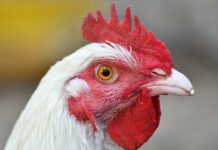NEW CUMBERLAND, W. Va. – With five Silver Stars under his belt, retired U.S. Army Brig. Gen. John Bahnsen is working on preserving something other than America.
These days, he spends his time conserving wildlife habitats on the Miller Family Farm in New Cumberland, W. Va.
Military history. In 1986, Bahnsen retired from the military. After his wife, Peggy, retired seven years ago, they moved to West Virginia to live on the Miller Family Farm, owned by Lucille Miller, Peggy’s mother.
Bahnsen admits that since both he and his wife are retired from the military, they don’t worry about making a profit from the farm. They focus instead on maintaining habitats and ground covers, and saving the farm’s natural resources, he said.
“People always talk conservation, but don’t do anything about it,” Bahnsen said.
He enjoys sharing his conservation practices with others and follows through with his own advice.
Legacy. The 130-acre farm has been in the Miller family for six generations.
It was deeded to the Millers after the Revolutionary War for their military services.
Bahnsen grew up in southern Georgia on a dairy farm, where he developed a passion for wildlife from his father, who was also a conservationist.
Preserving the game. “If you want deer, plant corn; if you want game birds, plant buckwheat and milo,” Bahnsen said.
He plants four rows of buckwheat and then four rows of milo to make cover for wildlife. The buckwheat provides lots of food and the milo stands tall and strong all winter, keeping the snow off the animals, Bahnsen said.
He is most proud of his switchgrass crop. Some of it is five years old and as tall as him.
It is great cover, he said, because it grows thick and provides a perfect place for ground birds to lay eggs.
Everyone thinks animals need food to survive the winter. They are partially right, but animals need cover from the cold and predators more than food, Bahnsen said.
Animals can find food; every plant produces a seed animals can eat, he added.
Protection. Pen-raised birds will survive on his property, he said. The more acres covered with brush, the more bird eggs will survive.
And, baby birds have no problem living in the fields of switchgrass because they can eat the grasshoppers and other bugs that jump at Bahnsen’s every step as he walks through the field.
The trick to having lush switchgrass, Bahnsen said, is cutting it down and burning it. The next year it will come up twice as thick.
He also plants hundreds of trees every spring on the farm, building maple and pine groves.
All types of weeds are allowed to grow in his fields, except multiflora rose, which is a thorny shrub with arching stems that takes over where it’s not welcome, said Bahnsen.
Rented ground. A neighbor rents 45 acres of the farm for free.
Bahnsen accepts no rent money for two reasons.
First, he puts restrictions on what the neighbor can plant and how he can farm the land. The renter is allowed to plant only grains like corn, wheat, barley and soybeans.
The neighbor is also not allowed to turn up the ground until spring, so the ground is not left completely bare through the winter.
Bahnsen also puts restrictions on what types of sprays the neighbor can use for pesticides and herbicides.
Another reason Bahnsen rents for free is because the wildlife on his land is likely to snack on the renter’s crops.
Hunting. Even though he is so involved in preserving the game on his own farm, Bahnsen rarely, if ever, hunts on the property. Instead, he makes trips to more than five states yearly with his hunting dogs.
But, he allows friends to hunt on the farm. The past two years, they have killed 30 deer each hunting season.
“I’ve got game out the gazoo,” Bahnsen said.
And, he brought Deep South hunting traditions with him to West Virginia.
For Labor Day weekend, he invites friends to his farm for a dove hunt.
About two weeks before the hunt, Bahnsen harvests a strip of wheat, then lines up all the straw in the field and sets it on fire.
Doves love burnt wheat and they will flock to the burnt strip, he says.
Bahnsen practices strip farming not only to conserve the soil, but also to have different types of cover for the wildlife to live in and eat.
Clean-cut fad. The clean lawn and pasture fad Americans embrace is endangering wildlife, he said, asking ‘if everywhere is mowed like a lawn, where is the game going to live?’
He encourages people to simply put the brush hog away and bring it out only when it is necessary.
“Think before you cut.” he said.
When he does cut down trees or brush to make paths, he doesn’t clear them out; he piles branches along the edge of the path, allowing animals such as beavers and rabbits to find cover.
Farms that are “cleaner than a whistle” look good, said Bahnsen, but have no good shelter.
“You can make a living farming while practicing conservation,” he said. “There is nothing about conservation that goes against good farming practices.”
Get 4 Weeks of Farm and Dairy Home Delivered









